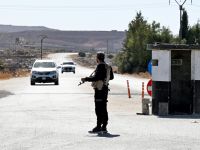Israeli military planners are getting ready for a major military assault on Palestinian cities, towns and refugee camps, as Washington continues diplomatic mediating efforts to forge a truce between the two sides according to a report Monday in the prestigious Washington Post daily.
The assault would be “broader and deeper” than the offensive undertaken earlier this month, Israeli officials said.
Officials told the daily that they intend to give cease-fire negotiations led by US special envoy Anthony Zinni a chance to succeed.
However, if the talks fail, there is increasing support both in Israeli Prime Minister Ariel Sharon's government and in the army for what one official described a "comprehensive military confrontation" with the Palestinians. On condition of anonymity, the officials expressed pessimism that the talks would lead to a durable end to violence and “terrorist attacks” against Israelis.
"The next days might be crucial, because if we don't succeed (in the talks), we may come to the conclusion that there is no hope, and we have to choose the other way," claimed one senior Israeli official.
Israeli warnings seem designed both to prepare domestic and international public opinion for a new round of bloodshed, and to cause the Palestinians to crack down on armed groups and accede to Israel's terms for a truce.
Israeli officials are reluctant to disclose the exact details of the military plans, other than to say they could involve the Israeli army driving “deeper into Palestinian cities, towns and refugee camps” than it did earlier this month, staying considerably longer and hunting down more suspected activists.
However, a senior Israeli Defense Ministry official on Monday denied this report by The Washington Post. "There are no such preparations," said the Israeli official, Yarden Vatikai.
In a related development, Israel’s Justice Minister and Security Cabinet member Meir Shetreet said Monday that Israel should carry out a short, intense, and comprehensive conflict with the Palestinians and then demand negotiations.
"We are totally fed up. As far as I am concerned (the Palestinian attacks) have passed every possible red line," Shetreet said, according to The Jerusalem Post.
"It's preferable to me that we have a war for one month - total war - reap the profits, and then go on to negotiations." The Minister said that Israel should also not allow Palestinian leader Yasser Arafat to travel to Beirut for the Arab League summit on Wednesday.
Arafat and Beirut Summit
Meanwhile, in spite of a US push to enable Palestinian leader Yasser Arafat to attend this week's Arab summit, Israel will not lift the travel ban on Arafat unless he takes decisive steps against “militants,” an adviser to Sharon said Monday. Israel will make its decision by Tuesday, said the adviser, Ra'anan Gissin.
"The cabinet has made a decision that Arafat will be able ... to go any place he wants only when he takes action to fight terrorism," Gissin said. "That is something that one cannot give up."
Several Israeli cabinet ministers have demanded that Sharon not allow Arafat to return. Sharon was to meet with key cabinet Ministers Monday evening to decide on Arafat's travel plans. Israel’s Defense Minister Binyamin Ben-Eliezer and Foreign Minister Shimon Peres favor lifting the travel ban, while members of Sharon's Likud party oppose the idea.
For his part, Dr. Nabil Shaath, the Palestinian planning minister, said from Beirut that Saudi officials would leave it up to Arafat to decide whether the initiative should be presented if the Palestinian leader is unable to participate in the upcoming summit.
Arafat spoke Monday with leading Arab diplomats meeting in Beirut ahead of Wednesday’s Arab summit, diplomatic sources said.
Arafat spoke to the ministers on the phone, through Saudi Foreign Minister Saud al-Faisal, they said. On Sunday, Shaath informed the ministers that Arafat's chances of attending the Arab summit in Beirut are "currently only 10 per cent", according to AFP.
The Arab officials had started earlier Monday informal discussions prior to an official meeting later in the day to draft the agenda of the Arab summit.
The ministers were holding a "morning consultation session" at the Phoenicia, a heavily-guarded luxury sea-front hotel which will also host the summit, officials said.
The Arab ministers held a similar informal meeting late Sunday during which the Saudi foreign minister made a "brief verbal report" regarding the peace proposal of Crown Prince Abdullah bin Abdel Aziz, they said.
The crown prince's proposal offers normal relations between Arab countries and Israel in return for the Jewish state's withdrawal from all Arab territory occupied in the 1967 Arab-Israeli war and a just solution for the problem of Palestinian refugees.
Sunday's late session also dealt with the conflict between Iraq and Kuwait and the chances of Arafat attending the summit, they said. Palestinian officials were still playing down the possibility Monday, while other Arab diplomats were more optimistic.
For his part, Palestinian minister of state for Jerusalem affairs, Ziad abu Ziad said Monday that Arafat would not attend the upcoming Arab summit in Beirut unless there were international guarantees that would ensure his return home.
Abu Ziad said in an interview with Cairo radio that the US is the one who should make those guarantees since Israel is controlled by American policy. He added that, in addition, Washington ought to promise it would keep it.
Abu Ziad continued that the Palestinian side would explain to Arab leaders the situation in the occupied territories and would describe the Israeli aggression against the Palestinians. He expressed hope that the Palestinian issue would gain significant support morally and financially in order to enable the Palestinian people to face their occupiers.
Regarding US Vice President Dick Cheney’s conditions over meeting with Arafat, Abu Ziad said that the common American approach in dealing with the Palestinian national authority is rejected because it is humiliating. (Albawaba.com)
© 2002 Al Bawaba (www.albawaba.com)







